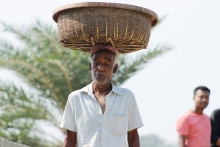Analysing data availability and policies in Myanmar for the progressive realisation of UHC in light of population ageing

May 2019 to December 2021
Lead research institution: University of Economics, Yangon, Myanmar
Other participating research institutions: Asian Development Bank; Ministry of Health and Sports, Myanmar; University of Public Health, Myanmar; and, Mahidol University
Principal investigators: Dr Min New Tun and Professor Cho Cho Thein, University of Economics, Yangon
Myanmar
Background
Myanmar is committed to the progressive realization of Universal Health Coverage (UHC) for the entire nation. The number of persons 65 years and over is expected to more than double to 9.8% of the population by 2035. It is timely, therefore, to review policies and nationally available data relevant to inform policies on UHC in the context of population ageing.
Goal
To analyse available data and policy documents to address the needs of ageing populations in the next National Health Plan 2022-2025 and inform future planning of UHC to 2030.
Methods
- National and international scoping review of published and grey literature covering issues related to UHC that is inclusive of ageing populations.
- Identification, mapping and evaluation of available data, plans, policies, and legislation in all government sectors related to older people’s health needs and impact on UHC.
- Interviews and consultations with key governmental and non-governmental stakeholders and service providers.
Results
1. The scoping review found that:
- Managing the health and social care needs of rural populations is a major issue for Myanmar since 77% of people with disabilities live in rural locales.
- Disability rates were high among older people, with 57% of the people 60 years and older reporting one or more physical difficulties, rising to 90% of those 80 years and older.
- Natural disasters present significant problems and impact the continuity of health and social care for older people, and those living with disabilities.
2. The policy and data mapping exercise revealed:
- Gaps in data about the health and social care needs of older people and their families, especially when compared to available data in other Asian countries such as China, Japan, Malaysia, and Thailand.
- No systematic means to assess disability and related service needs.
- A lack of defined health and social care benefits for older people.
Key stakeholders focused on the need to adapt the health system; expand primary care services accessible and appropriate for older people, including health promotion, prevention and rehabilitation services; and a life-course approach to the national strategy for UHC.
Global implications
To make progress towards UHC that is inclusive of older people, countries such as Myanmar will need to collect more high-quality data on older people and their families’ health and social care needs. This study found that Myanmar may also need to prioritize rural primary health and social care services development, improve their resilience to disasters, and define the public benefits for older people.
Local implications
Lessons from the Kansai region about developing health and social care systems that are resilient to disasters and inclusive of older people in rural areas, including data management issues, could be relevant to Myanmar and other countries facing similar challenges. Valuable experience and expertise are important to share with other countries, who need to collect evidence to inform health systems adaptation to population ageing.
Technical report
Publications
Kowal, P. , Tun, M. , Leik, S. and Rocco, I. (2021) Contributions of Social Networks to Health and Care Services in Myanmar’s Older Adult Population: 2012 Myanmar Aging Study. Health, 13, 1530-1545. doi: 10.4236/health.2021.1312109

